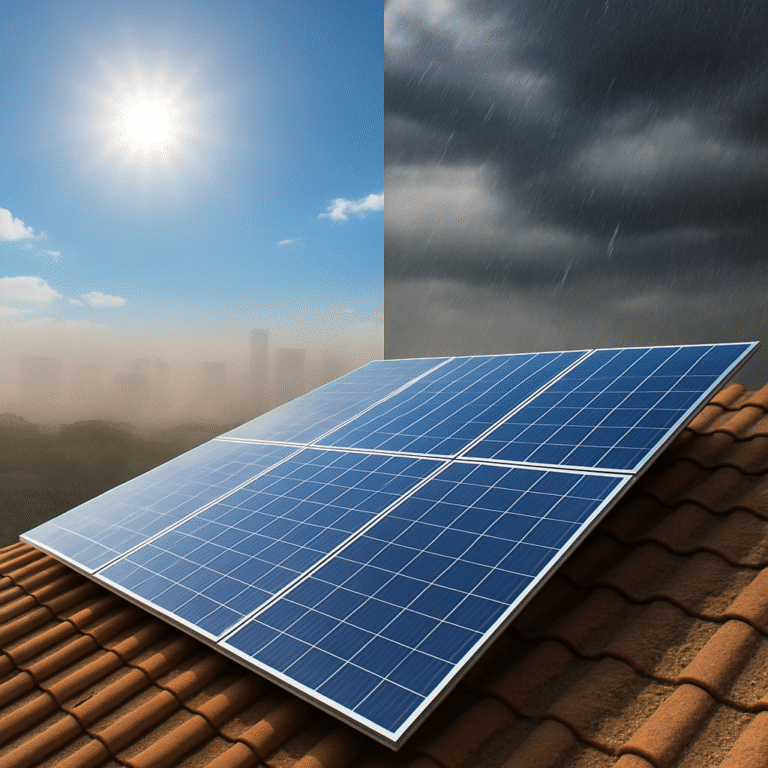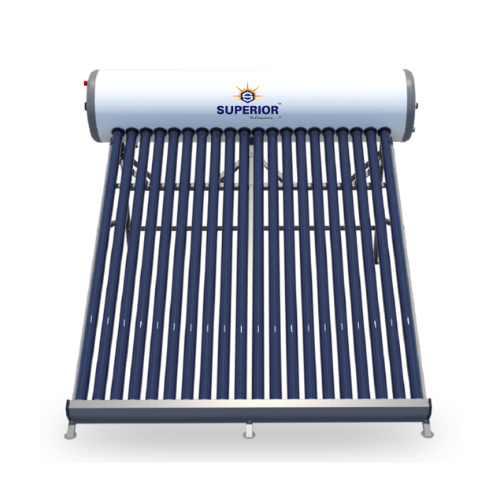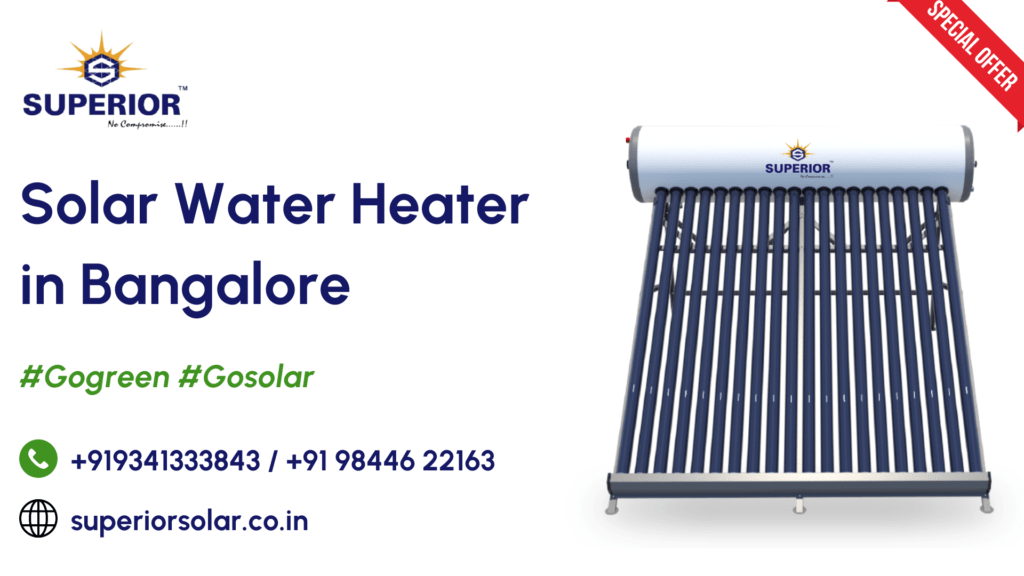What Affects Solar Panel Efficiency in Bangalore Weather Conditions? A Superior Solar Guide for 2025

As more residents and businesses in Bangalore turn to clean energy, solar panels have become a smart and sustainable solution for reducing electricity bills. But one crucial question we often get at Superior Solar is: “How exactly does Bangalore’s unique weather affect the efficiency of my solar panels?”
In this comprehensive guide, updated for 2025, we’ll go beyond common misconceptions and break down the key weather-related factors that truly impact solar energy generation in Bangalore. More importantly, we’ll share expert insights and proven strategies to help you maximize your solar investment and ensure peak performance year-round.
1. Sunlight Availability (Solar Irradiance): The Raw Power Source
Bangalore is blessed with an excellent solar potential. On average, the city receives approximately 6.44 hours of peak sunlight per day annually, making it ideal for solar energy generation. However, the intensity of this sunlight scientifically known as solar irradiance can fluctuate due to several factors:
Seasonal Changes: While Bangalore enjoys relatively consistent sunshine, the monsoon months (June–September) bring increased cloud cover, naturally reducing direct sunlight.
Atmospheric Interference: Air pollution, haze, or even smog (common in urban environments like Bangalore) can scatter or absorb sunlight before it reaches your panels, slightly diminishing performance.
Obstructions: Shadows cast by nearby tall buildings, towering trees, or even rooftop structures like water tanks can significantly impact individual panel output, leading to overall system losses.
Superior Solar Expert Tip: Optimal solar design is crucial. Our engineers utilize advanced solar design tools to map your rooftop’s solar potential, identifying and mitigating potential shading issues. We ensure panels are installed on shadow-free areas for maximum year-round energy capture.
2. Cloud Cover & Monsoon Impact: Adapting to Bangalore's Rains
Bangalore’s distinct monsoon season (typically June to September) is characterized by cloudy skies and regular rainfall. During this period, the reduction in direct sunlight can indeed lower the output of your solar panels by an estimated 10–20%.
But here’s why the monsoon is not a deal-breaker for solar in Bangalore:
Diffused Sunlight Still Works: Solar panels are designed to produce electricity even from diffused or indirect sunlight that penetrates cloud cover. While output is lower, it’s not zero.
Net Metering & Battery Backups: Modern solar systems in Bangalore are often integrated with net metering, allowing you to feed excess power to the grid during sunny periods and draw from the grid when production is low. Alternatively, a robust battery backup system can store surplus energy generated on sunny days for use during cloudy periods, ensuring uninterrupted power.
Hybrid System Advantage: At Superior Solar, we specialize in designing hybrid solar solutions that seamlessly blend grid power with solar generation, providing a reliable and efficient energy supply even during Bangalore’s monsoon months.
3. Temperature & Heat Sensitivity: Bangalore's "Sweet Spot" Climate
It’s a common misconception that hotter weather automatically translates to more solar power. In reality, solar panels are actually less efficient at higher temperatures. Standard efficiency ratings are measured at 25°C (STC – Standard Test Conditions). For every degree Celsius above this, a typical silicon panel’s efficiency can drop by around 0.3% to 0.5% (a factor known as the temperature coefficient).
Fortunately, Bangalore’s moderate climate works to your advantage. With average high temperatures generally ranging between 28–35°C, it experiences fewer days of extreme heat compared to many other parts of India. This relatively cooler climate throughout much of the year helps maintain optimal operating temperatures for your panels, making Bangalore a “sweet spot” for consistent, high-efficiency solar performance year-round.
4. Dust, Pollution & Maintenance: Keeping Your Panels Clean
While not as heavily polluted as some other major metros, Bangalore’s urban environment, vehicle emissions, and construction dust can lead to the accumulation of a thin layer of grime on solar panels. This layer can partially block sunlight, potentially reducing efficiency by up to 15% if left unaddressed (studies indicate even higher losses in severely dusty regions).
Superior Solar Maintenance Tip: Regular cleaning is key to unlocking maximum efficiency.
Routine Cleaning: We recommend cleaning your solar panels every 1–2 months using plain water and a soft cloth or brush. Avoid harsh detergents or abrasive materials that could scratch the panel surface.
Professional Care: For hassle-free maintenance and to ensure longevity, Superior Solar offers comprehensive Annual Maintenance Contracts (AMC). Our skilled technicians can perform thorough cleanings and system checks, ensuring your panels operate at peak performance
5. Roof Orientation & Panel Angle: Harnessing Bangalore's Sun Path
The precise tilt and orientation of your solar panels are fundamental to maximizing their energy capture throughout the day and year. For optimal performance in Bangalore:
South-Facing Panels are Best: Due to Bangalore’s location in the Northern Hemisphere, panels oriented directly South receive the most consistent and direct sunlight exposure throughout the day.
Ideal Tilt Angle: The optimal tilt angle for solar panels in Bangalore generally falls between 12–15 degrees. This angle is calculated to maximize annual energy yield by balancing sunlight capture across different seasons.
Expert Design: At Superior Solar, our experienced engineers conduct detailed site assessments. They meticulously calculate the optimal panel layout based on your roof’s exact direction, existing shade patterns, and available space, ensuring your system is perfectly aligned to Bangalore’s sun path.
6. System Quality & Technology: The Superior Solar Standard
Ultimately, the efficiency and longevity of your solar investment are also significantly determined by the quality of the components and the expertise of your installer. Not all solar solutions are created equal.
Panel Type Matters: We predominantly recommend Monocrystalline solar panels for residential and commercial installations. While generally more expensive upfront, they offer higher efficiency (typically 18-22% and above) and better performance in low-light conditions compared to Polycrystalline panels.
Balance of System Components: The quality of your inverter (which converts DC to AC electricity), the mounting structure, wiring, and other components directly impacts overall system efficiency and reliability.
Certified Excellence & Installation Expertise: At Superior Solar, we are committed to providing only BIS (Bureau of Indian Standards) and MNRE (Ministry of New and Renewable Energy) approved components. These certifications ensure that your system meets stringent national quality and safety standards. Our highly skilled and certified installation teams adhere to best practices, ensuring precise installation and minimal energy losses from the very first day. We pride ourselves on the quality of our solar installations in Bangalore, backed by numerous positive customer reviews.
Conclusion: Make Bangalore’s Weather Work For You with Superior Solar
While Bangalore’s weather certainly brings its unique mix of sunny and monsoon periods, the overall climate is exceptionally favorable for solar energy generation.
By understanding these key factors and, most importantly, by choosing the right system and partnering with a trusted, experienced installer like Superior Solar, you can significantly maximize your solar panel efficiency and enjoy reliable, cost-saving, clean power all year long.



